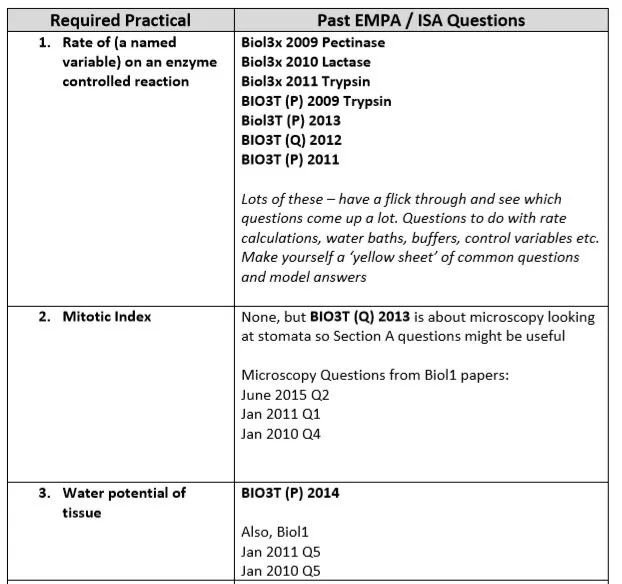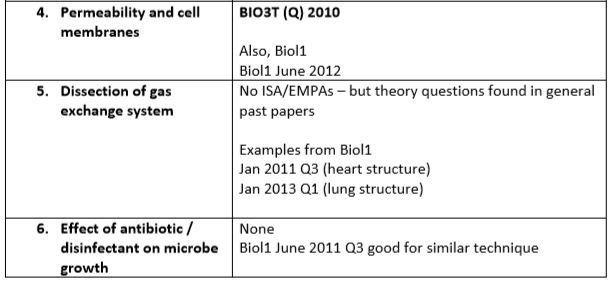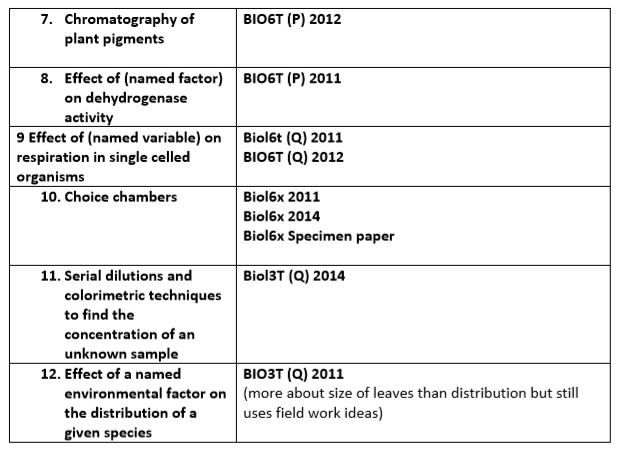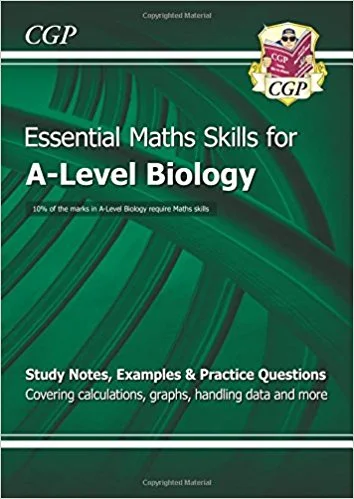It’s that time of year again, when external exams raise their heads and the phrase “…needs to develop their examination technique” gets banded about on reports. But, what is exam technique?
Do the majority of our students instinctively have it or develop it without our input? My gut feeling from experience is that it does come naturally to some students; the ideas of pace, highlighting and how to work through a paper can be quite logical to some. But to other students, the concept really is alien. In every batch of internal exams, there are always those students who miss out the last few pages because they ran out of time. There’s always those students who fail to read the question properly and go off on a tangent. And the most common for me at the moment, are those students who answer every single question correctly, yet only hit half the marking points and score 50%.
I do think that these skills are developed with practice; the more internal exams which are completed and the more past paper questions done, mistakes are reduced. I’ve also been trying to intervene and plan some specific lessons prior to our last batch of internal exams to try and reduce common errors and develop good exam technique.
Know your command term!
We use AQA for GCSE and A-level Biology and they provide a helpful guide to the command terms used in their exam questions. I’ve tried to re-word some of these into easier language and have them in a poster format on my walls and social media.
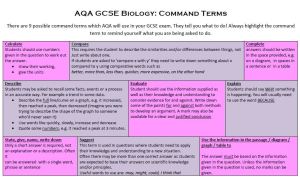
AQA GCSE Biology COMMAND TERMS
I’ve been focusing on ‘describe’ and ‘explain’ with my Y9 prior to their internal exams. When I first started at my current school, the Y9s mis-answered their January exam questions due to getting ‘describe’ and ‘explain’ muddled. I think more intelligent students are very suspicious of some ‘describe’ questions’; they’re almost too easy because they require no scientific knowledge. Anyone without having studied the topic, could score full marks on a describe question if they know what they’re doing. However, since training the Year 9s over the last two years, they’ve become very good at distinguishing between ‘describe’ and ‘explain’.
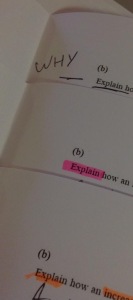
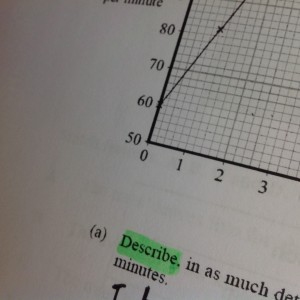
They now know to highlight the command term. Describe means “say what you see” and include some data. Explain means “say why” and that it’s ok to start the answer with “because”
We’ve also looked at the command term ‘evaluate’ and they can parrot off that it means “give two good points, two bad points and give your overall opinion”. I know this is a little over simplistic but I’m happy with this for students at the start of the GCSE course.
Students are also sometimes suspicious of ‘suggest’ as a command term as they can start to panic and think they should know something or haven’t been taught enough! I explain that ‘suggest’ means that the examiner wants you to hazard a sensible guess as to why something might be happening. I also make it clear that a ‘suggest’ question is off-specification!
Maximise your marks!
Students find it so frustrating to be told they have the answer right but just haven’t worded it well enough. Many students can waffle through a question and repeat the same idea many times in different words to fill up the space. I have two suggestions to avoid this:
Firstly, bullet pointing. I think this can often help students focus on getting the right number of distinct points. Students know that for the GCSE papers the need to write in prose will be identified in bold for the one longer question on each paper but other than that, there’s no need for full sentences.
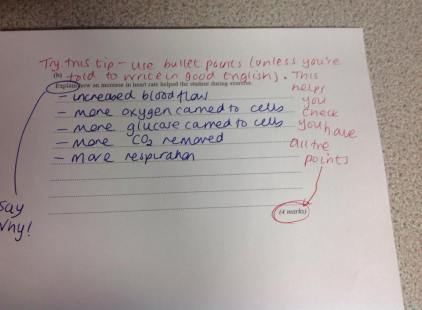 My second suggestion which I’ve seen work well was a student who put a little dot above every important scientific word in their answer. In a respiration question the key words are; oxygen, glucose, aerobic respiration, carbon dioxide, energy. Counting the number of dots and checking how many marks the question is worth can be helpful.
My second suggestion which I’ve seen work well was a student who put a little dot above every important scientific word in their answer. In a respiration question the key words are; oxygen, glucose, aerobic respiration, carbon dioxide, energy. Counting the number of dots and checking how many marks the question is worth can be helpful.
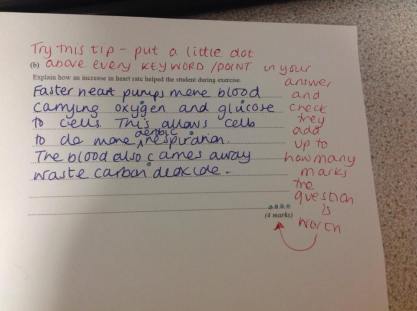
Read the question!
This follows on from the idea of reading the command terms but it’s equally important to read the rest of the question. All too often students will skip over the full page of diagrams, graphs and secondary sources until they find the dotted lines where they need to write. Or, indeed, students miss out entire questions due to the lack of dotted lines (you know who you are!) I encourage them to read the question carefully with the motivation that the answer to the question is often hidden away in the information and that everything is in the paper for a reason! Reading the secondary sources often allows you to anticipate what the question is going to ask; if they mention advantages and disadvantages of something you can bet there’s going to be an ‘evaluate’ question on its way; if they mention sample size there’ll be a question about experimental design and reliability.
Other important things to look out for include phrases like “using information in the question” (which isn’t a suggestion!) and any information in bold, e.g. “state two reasons why…”
Reading table headings and graph axes is so important to avoid careless errors. Graph questions are testing your ability to read a graph and there is often a red herring, e.g. heart rate given in beats per 15 seconds rather than per minute. Other instances are where you’re asked to compare two graphs and many students don’t notice the Y-axis scales are different:
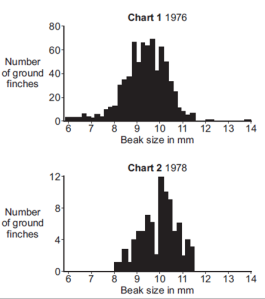
I have a stand along lesson which I use for GCSE which looks at command terms, calculations and graph analysis. Feel free to use / change as you wish:
GCSE Revision lesson command terms and graphs
GCSE Revision lesson, graphs and command terms
Pacing!
Pacing is something I feel most students generally get right and don’t need to be taught. However, there are always a few cases where the last few pages are missed out due to running out of time. We have an amazing SENCO at school who will look for evidence of slow processing speed and help students obtain extra time if needed. Learning difficulties aside, it is worth mentioning pacing to students. We have a roughly one-mark-per-minute aim with our papers which leaves room for checking over answers.
It’s worth teaching students they can complete the paper in any order they want. I’d always recommend they go though the paper once, completing any questions they can do quickly and easily and put a little star next to the ones they need to come back to. Calculation questions take some students much more than the 1 minute/1mark allocation and in some cases these might be best missed out until the end of the exam.
With out Unit 5 A-level paper, there is a 25 mark synoptic essay right at the end. We advise students that this should be the first thing they approach. The could allow themselves 5 minutes to complete an essay plan then go back to the start of the paper and complete the regular Unit 5 questions. That way, the essay will be in their mind for the hour it takes to complete the normal questions and they can add to their plan anytime something pops into their head (or, indeed, if something in one of the questions gives them inspiration!)
Proof read
Use any remaining time productively! Cover up your long answers and re-write the question in your head. Have you included all key words? Could you add in any more scientific words to your answer? Have you been specific enough? Have you said “the rate changes” when you mean “the rate decreases” or have you said “breathing rate increases” when you could say “breathing depth and rate increases”?
Double check your graphs and calculations; make sure you’ve not done anything silly! Have you remembered units? Have you shown working?
Find the question that asks you to write in good English. Re-read it carefully. Check spellings and handwriting.
And for goodness sake, check you’ve remembered to turn over the back page. “I didn’t realise there was a question on the back!” is never something you want to hear!
Anything else?
Obviously there are many more factors which could come under the heading ‘exam technique’ which I haven’t discussed here. Things like hydration, diet, sleep etc. Maybe I’ll continue this post another time….

